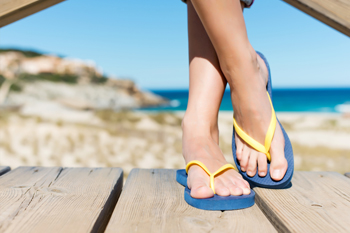 While flip-flops may signal the arrival of sunny summer days, they can also pose risks to foot health. These seemingly carefree shoes offer minimal support and protection, potentially leading to various foot problems. The lack of arch support and cushioning in flip-flops can alter the way people walk, causing them to grip the sandals with their toes, leading to strain and fatigue. This altered gait can also impact other parts of the body, potentially causing knee, hip, or back pain. If you opt for flip-flops, choose high-quality leather shoes that offer better support and durability. Ensure they fit well and reserve them for short periods or casual occasions. If you experience discomfort or have issues from wearing flip-flops, it is suggested that you consult a podiatrist for individualized treatment and advice on appropriate footwear choices for optimal foot health.
While flip-flops may signal the arrival of sunny summer days, they can also pose risks to foot health. These seemingly carefree shoes offer minimal support and protection, potentially leading to various foot problems. The lack of arch support and cushioning in flip-flops can alter the way people walk, causing them to grip the sandals with their toes, leading to strain and fatigue. This altered gait can also impact other parts of the body, potentially causing knee, hip, or back pain. If you opt for flip-flops, choose high-quality leather shoes that offer better support and durability. Ensure they fit well and reserve them for short periods or casual occasions. If you experience discomfort or have issues from wearing flip-flops, it is suggested that you consult a podiatrist for individualized treatment and advice on appropriate footwear choices for optimal foot health.
Flip-flops can cause a lot of problems for your feet. If you have any concerns about your feet or ankles, contact the foot specialists from Podiatry Associates of Belleville. Our doctors will assist you with all of your foot and ankle needs.
Flip-Flops and Feet
Flip-flops have managed to become a summer essential for a lot of people. While the shoes may be stylish and easy to slip on and off, they can be dangerous to those who wear them too often. These shoes might protect you from fungal infections such as athlete’s foot, but they can also give you foot pain and sprained ankles if you trip while wearing them.
When Are They Okay to Wear?
Flip-flops should only be worn for very short periods of time. They can help protect your feet in places that are crawling with fungi, such as gym locker rooms. Athlete’s foot and plantar warts are two common fungi that flip-flops may help protect your feet against.
Why Are They Bad for My Feet?
These shoes do not offer any arch support, so they are not ideal for everyday use. They also do not provide shock absorption or heel cushioning which can be problematic for your feet. Additionally, you may suffer from glass cuts, puncture wounds, and stubbed toes since they offer little protection for your feet.
More Reasons Why They Are Bad for Your Feet
- They Slow You Down
- May Cause Blisters and Calluses
- Expose Your Feet to Bacteria
If you have any questions, please feel free to contact our office located in Belleville, NJ . We offer the newest diagnostic and treatment technologies for all your foot care needs.